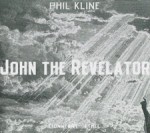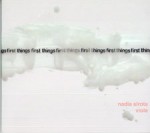Column Name
Title
Phil Kline: John the Revelator (Cantaloupe CA210470)
Body
Possibly best known for Unsilent Night, his Christmas boombox piece, and Zippo Songs, with words that soldiers in Vietnam etched on their cigarette lighters, composer Phil Kline has taken a somewhat radical turn with this recent release, John the Revelator. Using a spare combination of voices coupled with a string quartet, Kline has forged a contemporary Mass, setting the Latin Ordinary (the parts that remain the same from week to week) for a cappella chorus—in this case the superb six-member Lionheart ensemble. For the Propers (which change seasonally) Kline uses the Old Testament, two poems by David Shapiro, and the “Meditation” from Samuel Beckett’s The Unnameable. (Esoterica lovers will be charmed at how differently Kline approaches Beckett’s words, as compared to Berio’s treatment in his Sinfonia.) For these diverse texts, Kline adds the string quartet Ethel, whose members—Cornelius Dufallo and Mary Rowell (violins), Ralph Farris (viola) and Dorothy Lawson (cello)—are all Juilliard alumni.
As novel bookends, the first and last parts draw upon two North American songs—“Northport” and “Wondrous Love”—from the Sacred Harp, an American tradition of four-part hymn singing closely related to shape note singing. These 19th-century classics are rough-hewn, designed to be easy enough for novices to sing, but gain luster from Lionheart’s polish and precision. In between, the sections of Kline’s Mass alight on minimalism and medieval chant, perhaps reaching a climax in “Dark Was the Night,” a haunting vocalise that begins with a somber drone but gradually picks up speed as the strings become more frenetic.
Recorded at the Church of St. Luke in the Fields in Greenwich Village, the recording was engineered, mixed, and edited by Dave Cook, a veteran who has worked with countless rock groups in the 1980s, such as the B-52’s, Suzanne Vega, 10,000 Maniacs, and the Mighty Mighty Bosstones. Here, the church’s resonance seems to add a slight formality, only enhancing Kline’s unconventional take on a classic form.
First Things First. Nadia Sirota, viola. New works by Nico Muhly, Marcos Balter, and Judd Greenstein. (New Amsterdam Records NWAM016)
After five years of commissioning, violist Nadia Sirota, who earned a bachelor’s and a master’s degree from Juilliard, has conceived a program of composers whom she describes as her “best collaborators,” on a veritable 21st-century Juilliard love fest called First Things First. It opens with alum Nico Muhly’s enigmatically titled Duet No. 1: Chorale Pointing Downwards (2003), which uses a cycle of 14 chords repeated almost continuously until the end. Cellist and Juilliard alum Clarice Jensen joins Sirota in this brief, transparent exercise, with which Muhly wanted to convey “a kind of harmonic rapture.” Sirota then goes solo for Muhly’s Étude I, playing in bluesy melodic counterpoint with an audio track—roles which are then reversed in Étude IA.
Composer Marcos Balter contributes Ut (2005), a meditation for solo viola based on the Latin word that can mean “how,” “where,” or “when,” depending on its context. The word’s meaning manifests itself in the varied and delicate effects created by minute changes in the musician’s arm or bow placement. His second piece, Live Water (2007), uses prerecorded, whispered text fragments from Clarisse Lispector’s book Água Viva, in ghostly counterpoint to Sirota’s buzzing overlay.
Judd Greenstein contributes an appealing, slightly melancholic solo called Escape (2006), a study of repetition which he describes as “of the uneven, quivering variety.” His quintet, The Night Gatherers (2005), closes the program, with Sirota joined by the Chiara String Quartet, the graduate quartet-in-residence at Juilliard from 2003 to 2005. Greenstein wrote the piece as a memorial for a friend’s grandmother. Its signature is a gentle glissando—I hear it as an “upward murmur,” perhaps as a nod to the hereafter—which leads to a passionate climax, before the motif appears again, now against a backdrop of shimmering high strings.
As if there weren’t enough Juilliard personnel involved, the engineer is Ryan Streber, who recorded the entire project at Sage Hall, Smith College. The multitalented Streber, who received both a B.M. and M.M. from Juilliard, also serves as director for the School’s Composers Forum and coordinator for the composition department. Judging from his truthful results with Sirota’s recording, I doubt she is anything but delighted to have him in her corner.






